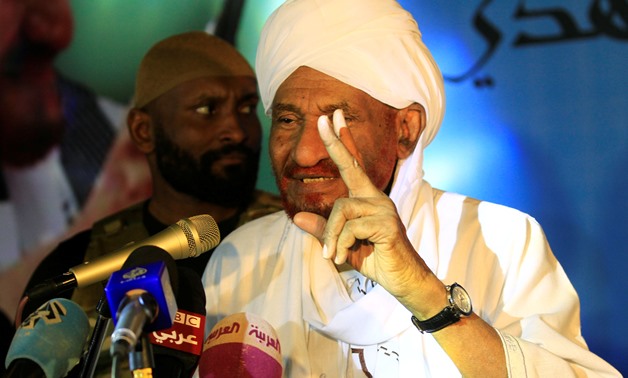
Sudanese leading opposition figure Sadiq al-Mahdi addresses his supporters after he returned from nearly a year in self-imposed exile in Khartoum, Sudan December 19, 2018. REUTERS/Mohamed Nureldin Abdallah
KHARTOUM – 20 December 2018: Leading Sudanese opposition figure Sadiq al-Mahdi returned to Sudan on Wednesday from nearly a year in self-imposed exile and called for a democratic transition before thousands of supporters.
Mahdi was Sudan's last democratically elected prime minister.
He was overthrown in 1989 by an alliance of Islamists and military commanders that still form the nucleus of President Omar Hassan al-Bashir's all-powerful National Congress Party.
"The regime has failed and there is economic deterioration and erosion of the national currency's value," Mahdi, who heads Sudan's opposition Umma party, said.
He was speaking at a public square in Omdurman, which sits across the Nile from Khartoum before 7,000 of his supporters who chanted slogans including: "The people want a new regime" and "No to war, yes to peace".
Sudan has been facing an economic crisis since the south seceded in 2011, taking with it three-quarters of Sudan’s oil output. The opposition says Bashir must go to improve the country’s image abroad and attract crucial investment and aid.
Sudan is due to hold a presidential election in 2020.
Unless the constitution is changed, Bashir, in power since 1989, is not permitted to stand again when his present term ends, having won two elections since a 2005 constitutional amendment took effect imposing a two-term limit.
But a majority of lawmakers earlier this month backed a constitutional amendment that would allow him to seek reelection.
"The prescription is to call for a memorandum of national salvation signed by all the sons of the nation and representatives of the parties and civil society," Mahdi said.
The memorandum would commit to a ceasefire, ensure the delivery of humanitarian aid and launch public freedoms.
He also called for the formation of a transitional consensus government that would be tasked with reforming the economy and holding a constitutional conference on peace, human rights and democratic governance.
In October, Sudan sharply devalued its currency from 29 pounds to the dollar to 47.5 after a body of banks and money changers set the country’s exchange rate.
The move led to further price increases and a liquidity crunch, while the gap between the official and black market rates has continued to widen.
About 310 km north of Khartoum, a state of emergency and 12-hour curfew was declared in the city of Atbara after protests against price increases broke out.
Port Sudan, the capital of the state of the Red Sea, also saw limited protests, witnesses told Reuters.

Comments
Leave a Comment